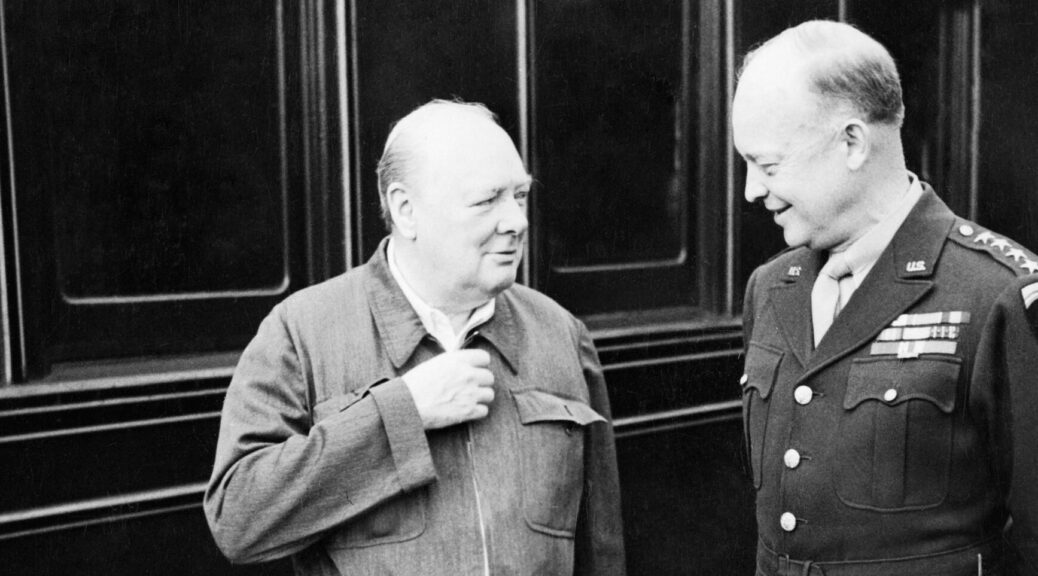
Did Eisenhower Offer to Quit Over WW2 Bombing Policy?
Excerpted from “Did Eisenhower Threaten Resignation Over Bombing Policy?” written for the Hillsdale College Churchill Project using my pen name Max E. Hertwig. For the original article with endnotes and more images, click here. To subscribe to weekly articles from Hillsdale-Churchill, click here, scroll to bottom, and enter your email in the box “Stay in touch with us.” We never disclose or sell your email address. It remains a riddle wrapped in a mystery inside an enigma.
Q: Did Ike offer to go?
This question involves the weeks before Operation Overlord, the invasion of France in 1944. The producer of a forthcoming documentary asks if General Eisenhower, the Allied Supreme Commander, threatened to resign over bombing policy. The specific question: “Was Churchill so fixated on bombing German cities that he resisted supplying bombers for D-Day?”
A: Neither truth nor heresy
The answer is twofold. Yes, Eisenhower threatened to resign over bombing policy. No, it was not because Churchill wanted withhold bombers in order to maintain bombing of German cities. Contrary to popular cant, Churchill was never an enthusiast of bombing cities; he was the only Allied leader ever to question the practice. (See “The Myth of Dresden and Revenge Firebombing.”)
Eisenhower’s threat to resign was not made to Churchill, but to his colleagues, General Carl Spaatz and Air Chief Marshal Sir Arthur Harris.
A related subject is Churchill’s pre-D-Day concern for French civilian casualties—another expression of his sense of morality versus the exigencies of total war. That is also a reminder of current proportional concerns for Gaza.
The vital role of air power
Dwight Eisenhower appreciated the importance of air superiority. The February 1943 first encounter of U.S. and Axis forces in Africa was at the Kasserine Pass. German General Irwin Rommel inflicted a disastrous defeat, thanks in part to U.S. air power being assigned to local commanders. In his book Crusade in Europe, Eisenhower explained that the invasion of Europe could not happen “until we had established ourselves so firmly that danger of defeat was eliminated—all air forces in Britain, excepting only the Coastal Command, should come under my control.”
Defeat at Normandy, Eisenhower wrote, would have meant redeploying all U.S. forces accumulated in Britain. “The setback to Allied morale and determination would be so profound that it was beyond calculation.”
In that event, Russia might consider her Allies “completely futile and helpless,” even make a separate peace with Hitler. “[W]hen a battle needs the last ounce of available force,” Eisenhower wrote, “the commander must not be in the position of depending upon request and negotiation….”
Eisenhower’s ultimatum
The crunch came on Saturday, 25 March 1944. The historian Rebecca Grant wrote: “Eisenhower convened a meeting to settle the issues. On the Wednesday prior, he grimly thought through the idea that if he did not get the decision he wanted, ‘I am going to take drastic action and inform the combined chiefs of staff that unless the matter is settled at once I will request relief from this command.'”*
Lieutenant-General Carl Spaatz, commanding U.S. Strategic Air Forces, believed that air superiority would best be achieved by “sustained strategic bombing of synthetic fuel plants and aircraft factories.” Royal Air Force Marshal Arthur Harris also dissented. He opposed diverting his nighttime bombing of German cities.
Churchill first supported Spaatz and Harris, but in Washington, Generals George Marshall and “Hap” Arnold backed Eisenhower. Churchill then deferred to Roosevelt, who would not countermand his supreme commander. By early April, Harris had come around, and Eisenhower had overruled Spaatz.
*Rebecca Grant, “Eisenhower, Master of Air Power,” Air & Space Forces, 1 January 2000.
Bombing France
An adjunct to this question is a controversy often involving Churchill: civilian bombing casualties. Pre-Normandy bombing targeted German railroad marshaling yards and airfields in France. Estimates were circulating of French civilian losses as high as 80,000.
Churchill acted with his sense of morality and concern for French allies. On 3 May 1944, he importuned the War Cabinet. What he feared, he told them, was “propaganda to the effect that, while the Russian and German armies advanced bravely despite the lack of air superiority, the British and Americans relied on the ruthless employment of air power regardless of the cost in civilian casualties.”
Foreign Secretary Anthony Eden said French reaction to these necessary bombings had so far been good. But Deputy Prime Minister Clement Attlee voiced alarm. The “political disadvantages of the plan,” Attlee said, “outweighed its military advantages.”
Churchill asked Air Marshal Tedder whether he could accept a limit of 10,000 French civilian deaths up to D-Day. Tedder said yes. In fact, only 3000-4000 had been killed to date.
“Piling up an awful load of hatred”
The “Transportation Plan,” as it was known, went ahead in the weeks preceding D-Day. Churchill followed it with mounting concern. “Terrible things are being done,” he wrote Eden. “The thing is getting much worse.”
To Tedder he wrote they should have attacked the German armies, which “involve no French casualties. You are piling up an awful load of hatred. I do not agree that the best targets were chosen. Have you exceeded the 10,000 limit?”
June 6th came and the troops swarmed ashore at Normandy. Churchill’s alarm proved unfounded. French civilian losses in pre-D-Day bombings remained under the limit he had set.
Some care, some don’t
As supporters of Israel argue over the current civilian casualties in Gaza, this history is relevant. It seems that civilian casualties only occur to leaders of civilized governments. Hitler, Stalin, Saddam Hussein, and certainly Hamas, never worried about deaths of innocents.
In 1944, the arguments, heart searchings and constant changes of targets continued almost up to D-Day. The 1945 Battle of Manila (which had half Gaza’s population) resulted in 250,000 civilian casualties including 100,000 deaths. When told that statistic, Prime Minister Netanyahu was astonished: “100,000…well, we have incurred considerably fewer.” (The proportion is on the order of 15 to 1.)

Civilian casualties: further reading
“The Myth of Dresden and ‘Revenge Firebombing,'” 2023.
“Winston Churchill’s Revulsion Over Napalm Bombing,” 2023.
“Bombing Auschwitz: ‘Get Everything Out of the Air Force You Can,'” 2020.
“Bombing Japan: Churchill’s View,” 2016.
“Churchill and the Bombing of Coventry,” 2012.
“Winston Churchill and the Use of Chemical Warfare,” 2015.
John Spencer – Benjamin Netanyahu Interview, 27 February 2024.






